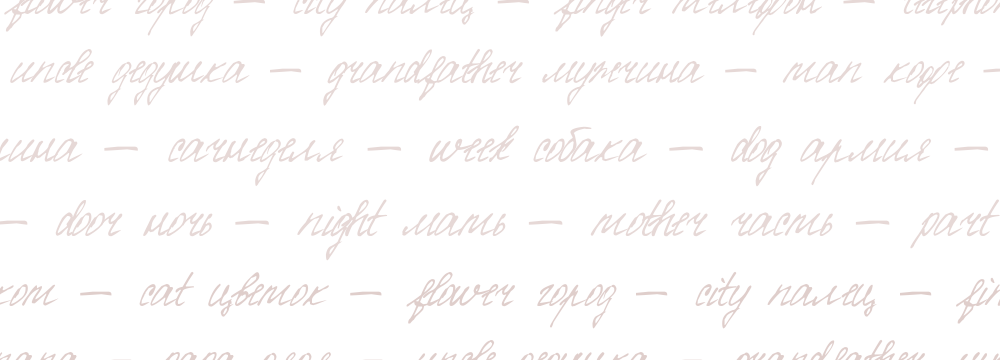

A Complete Guide to Nouns and Gender in Russian
Like several other foreign languages, Russian is a gendered language. What does that mean? If this is your first time learning a gendered language, this means that every single noun (people, places, and things) has a preassigned gender. Nouns in Russian are either masculine, feminine, or neuter, and, for the most part, do not correspond to the meaning of the noun. Rather, the gender of Russian nouns is determined by the noun’s ending in the nominative case. Luckily, in Russian, there are only a few exceptions to this rule, so it is a relatively clear-cut process to determine a noun’s gender. So, let’s dive into nouns and gender in Russian!
Want to learn more about the basics of Russian? Check out the rest of my Russian Basics articles!
Gender in Russian

Why is gender important to learn?
Why is it important to learn about Russian gendered nouns? It is necessary to know the gender of a noun for 2 main reasons:
- Any parts of speech that modify a noun must match the gender of that noun.
Ex. Adjectives – Adjectives do not have an intrinsic gender, rather they are changed to match the gender of the nouns they are modifying/describing.
Let’s say you want to describe your home. The word for home in Russian is “дом.” Because the word ends in a consonant (see below for a chart of all endings), the word “дом” is masculine. Therefore, if we want to describe the house using an adjective — let’s say we want to say “yellow house” — the adjective, “yellow,” must also be masculine. Therefore, “yellow house” is “жёлтый дом”.
Now, let’s say we have a noun that is feminine, for example “кошка,” which means “cat.” If we want to say “yellow cat,” we use the same adjective meaning “yellow,” however, we change the ending of the adjective, not the noun. So, we change the masculine adj. жёлтый → feminine adj. жёлтая. They have the same meaning, but one is used with masculine nouns and the other with feminine nouns.
- The endings of the nouns can change in different cases depending on its gender.
If you are unaware of the case system in Russian, check out my study guide on the Russian Case System. The case system and its functions dictate spelling changes that are based upon the gender of nouns.

Russian Noun Endings by Gender
Before you get too overwhelmed (I definitely was at first, so don’t sweat it), it’s not totally a guessing game when it comes to the relationship between a word and its gender. As mentioned above, a noun’s gender correlates to its ending, so let’s start there!


Gender in Russian Exceptions
If there is one thing I appreciate in a language, it is consistency in its rules. The majority of Russian is very consistent in this regard, however, like every language, even Russian has its exceptions. Below are 3 exceptions to the rule that gender is determined by a noun’s ending.
- For some words, gender is dictated by its meaning rather than its ending — This is the case for several masculine words that end in -а & -я, and whose meanings correspond to traditionally masculine family members.
- Папа (м) – Dad
- Дедушка (м) – Grandpa
- Дядя (м) – Uncle
- “Imported” words”— Imported words are words that are derived from a foreign language. These words vary in gender, however, they are all indeclinable. This means that they only have the one form, and they do not decline – regardless of number or case.
- Саля́ми (ж) – Salami
- Торна́до (м) – Tornado
- Кака́о – Cocoa
- Меню́ – Menu
- Резюме́ – Resume, CV
- Такси́ (ср) – Taxi
- Шоу (ср) – Show
- Ко́фе (м) – Coffee
- Common gender nouns— For most nouns in Russian that describe people (occupation, general qualities etc.) the endings vary slightly if you are describing a man or a woman. For example: waiter (официант и официантка), teacher (учитель и учительница), singer (певец и певица). Common gender nouns, however, can refer to both men and women alike.
- У́мница – Smart person
- Сирота́ – Orphan
- Колле́га – Colleague
- Неря́ха – Slob, mess
- Обжо́ра – Glutton
- Со́ня – Sleepyhead
- Неве́жа – Impolite, rude person
- Неве́жда – Ignoramus

Additional Resources on Nouns and Gender in Russian
Check out these websites and videos below for some extra Russian help!
- Russian Lessons.net – Gender in Russian
- Master Russian – Noun Gender and Number
In need of a better way to organize your language notes? Check out my planner below!
Learn to speak russian
Travel with ease & dive into the culture, history & lifestyle of post-Soviet countries
free russian learning materials
Melissa
Get the Goods
Head over to the Language & Travel Shop to check out my favorite goodies I use for learning Russian and traveling! I've compiled all my favorite products I use when #onthebloc so that you can benefit from them when you travel abroad. Help yourself prepare and support this blog at the same time :) Счастливого пути!
carry-on goods
gifts for travelers
photography
apparel & accessories
textbooks & readers
luggage & bags
categories
#oTB essentials
Russian-Speaking Travel Destinations
use your new russian skills in real life!
Belarus
EASTERN EUROPE
central Asia
central Asia
Eurasia
Russia
Kyrgyzstan
armenia
Moldova
Kazakhstan
eastern europe
read »
read »
read »
read »
read »
read »
The caucasus